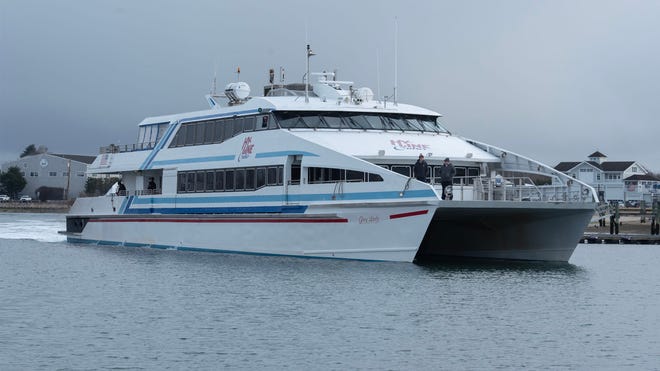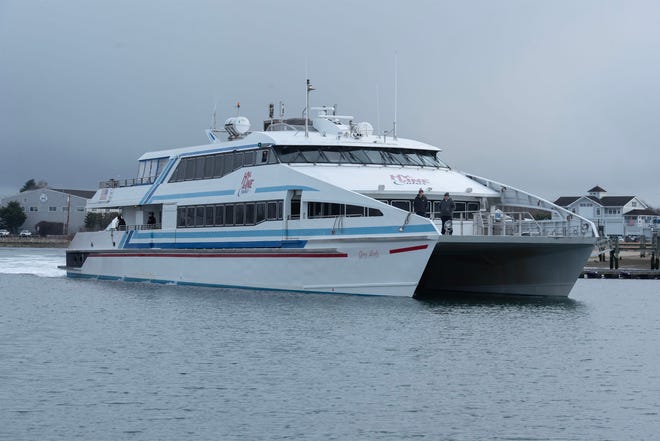
Nantucket could face significant economic fallout if the federal government proceeds with a proposal to expand vessel speed restrictions into Nantucket Sound during the off-season, according to a study by the University of Massachusetts Donahue Institute’s Economic and Public Policy Research Group. The study estimates nearly a $300 million annual loss in economic activity.
The restrictions, meant to reduce the risk of collisions with critically endangered North Atlantic right whales, would affect the island’s ferry service, reducing the number of sailings and the speed at which ferries operate from Nov. 1 to May 30 each year. Nantucket officials have argued that, while they agree it’s important to protect right whales, the animals are not present in the sound.
The study found that changes as proposed by NOAA would eliminate fast ferry service during the off-season and reduce the number of daily round trips on the Woods Hole, Martha’s Vineyard and Nantucket Steamship Authority’s mixed passenger-cargo ferries from three to two — a shift that island leaders fear would have deep repercussions for Nantucket.
The findings were discussed at a joint meeting of the Select Board, Nantucket County Commissioners and Nantucket Planning & Economic Development Commission on Dec. 18.
Select Board Chairwoman Brooke Mohr has her doubts about NOAA’s initial estimate of “tens of millions of dollars” in economic impact, which local officials believed to fall short.
“There is a $100 million threshold by which the federal government is required to have a different regulatory approval and public input process,” Mohr said, “so we engaged the Donahue Institute to do an analysis of the potential impact.”
Quantifying effects on Nantucket’s economy
Rod Motamedi, assistant director at the Donahue Institute, clarified that the study aimed to quantify the economic effects of reduced ferry service, and is not a cost-benefit analysis of the reduced probability of whale strikes.
The study used data on passenger volumes, commuter patterns, visitation trends, and the value of goods traded to and from Nantucket.
One major finding was the effect on the fast ferry service during the off-season.
“What’s important to emphasize is that it’s not that high-speed ferries will just go slower, it’s that they won’t run at all,” Motamedi explained.
Concerns for commuters, visitors and trade
One top concern is the effect on the 1,255 commuters who make up 22% of Nantucket’s workforce.
With a speed restriction, round-trip travel would take six hours, and with limited ferries each way, commuting would become impractical. Many commuters might stop making the trip, leading to a loss of $192 million in economic activity, 980 jobs, and $33 million in tax revenues, according to the institute.
The housing market on Nantucket makes it unlikely that commuters would just move there instead, Motamedi added.
The study also predicts a loss of visitors, especially day-trippers and short-term visitors. The increased travel hassle would deter many from coming, Motamedi said. This could result in a $72 million reduction in economic activity, 465 jobs, and $13.8 million in lost tax revenue.
Trade, another concern, could also see a significant cut. Cargo capacity could be cut by a third, jeopardizing 17% of the island’s annual goods trade.
“Losing out-bound trade represents $22 million of economic activity, 60 jobs, and $2.7 million in tax revenues,” Motamedi said.
The effect on in-bound trade, including essential supplies like food, fuel, and medical goods, is harder to quantify, he said, “but we are fairly certain it will be negative.”
Effects on public services, health care and education
Reduced ferry service would also affect access to essential services on the mainland. Peter Schaefer, a resident, is worried, saying, “many medical services and medical professionals can only be found on the mainland. Right now, you can do that in one day without staying over and without paying ridiculous airfare. This change will make that impossible.”
Motamedi noted the challenges of quantifying the loss of access to medical services, but it has real effects on quality of life. Education could also be affected, as the island’s school system relies on ferry service for educational trips and athletic activities.
Concerns raised over housing and property values
Another concern raised at the meeting was the potential decline in property values. Wendy Hudson, an at-large member of the Nantucket Planning & Economic Development Commission, worries that people might leave the island, causing property values to plummet.
Motamedi acknowledged that while the full effect on the housing market is difficult to measure, a decrease in Nantucket’s appeal as a year-round community could lead to lower property values. This might also increase the number of “seasonally vacant” homes, which already make up a substantial portion of the island’s housing stock.
Selectman and County Commissioner Matt Fee added that there might not be new growth, and taxes could shift, with lower-income residents potentially paying more and forcing them off the island.
The Donahue study estimates an overall $286 million loss in economic activity, eliminating 1,500 jobs — about 11% of Nantucket’s economy and workforce, excluding further losses from supply chain disruptions.
Nantucket leaders on Thursday submitted the study, along with a letter to federal and state representatives, to advocate for reconsideration of the regulations, including a letter to Gov. Maura Healey
Where are the right whales?
In their letter, Nantucket leaders acknowledged it’s imperative to protect the right whale population but argued that conservation efforts should focus on areas where the whales are, “and that is not Nantucket Sound.”
According to ferry operators, they wrote, there have been no documented right whale sightings in Nantucket Sound during more than one million trips between Hyannis and Nantucket over the past 25 years.
Meanwhile, scientists with the New England Aquarium have increasingly observed right whales around the Nantucket Shoals southeast of the island, and this spring, several were spotted in unprotected areas, including the shipping lanes south of Cape Cod. But because they focus survey efforts south of the islands, they don’t have readily available data for Nantucket sound.
Heather McCarron writes about climate change, environment, energy, science and the natural world, in addition to news and features in Barnstable and Brewster. Reach her at hmccarron@capecodonline.com.
Thanks to our subscribers, who help make this coverage possible. If you are not a subscriber, please consider supporting quality local journalism with a Cape Cod Times subscription. Here are our subscription plans.

